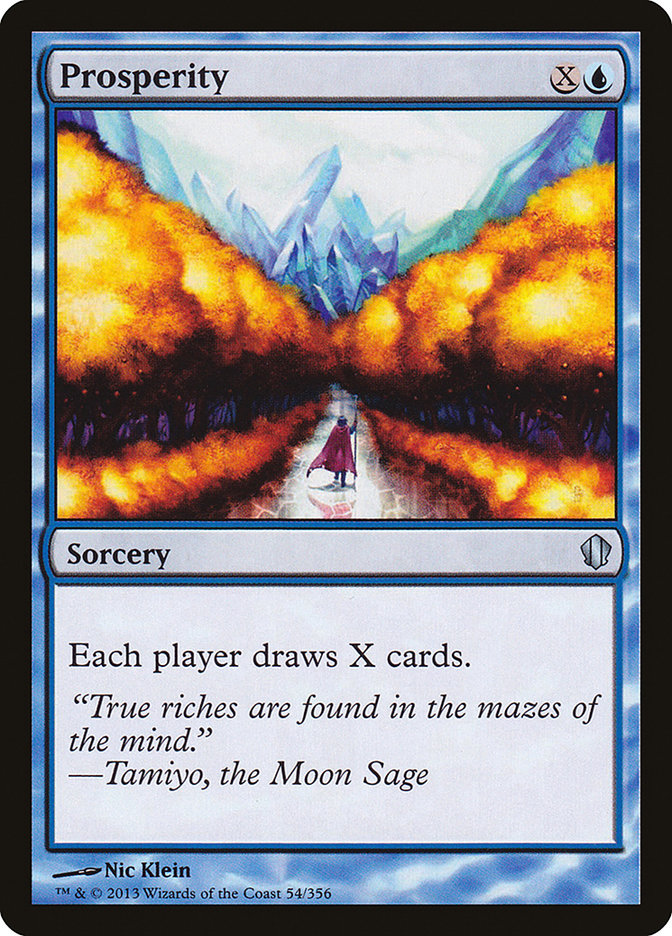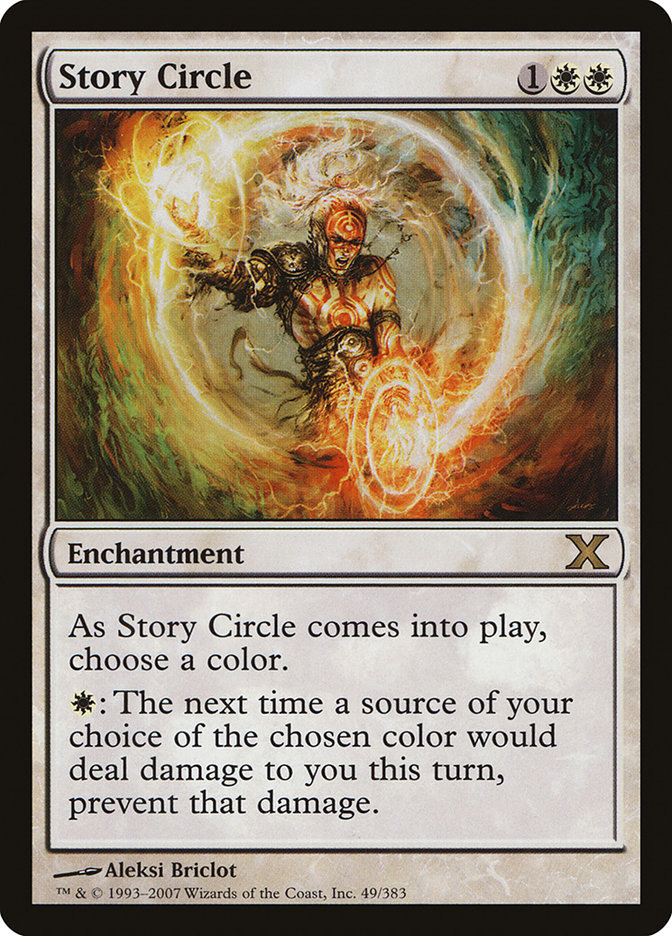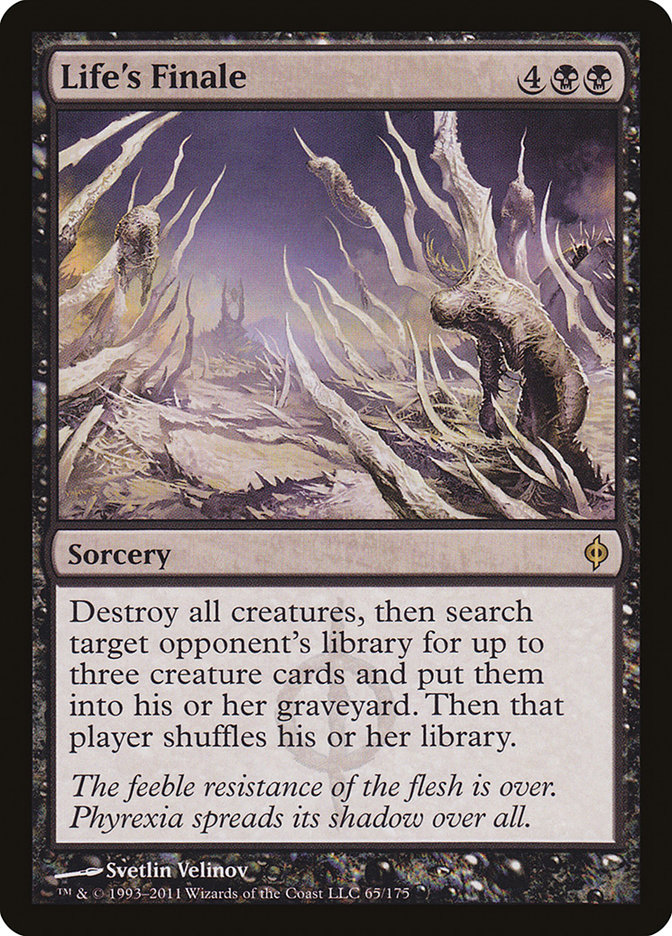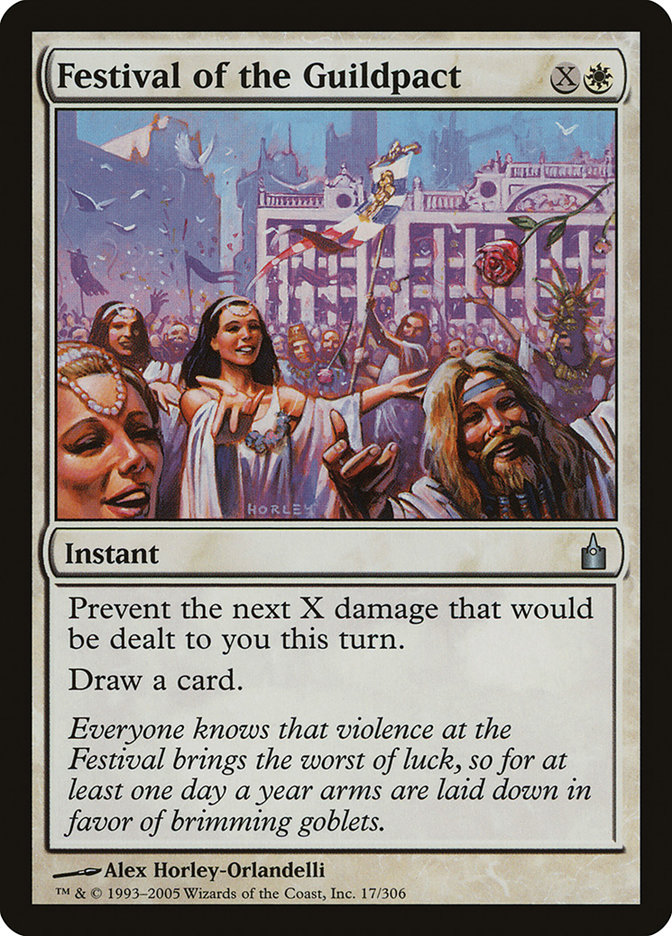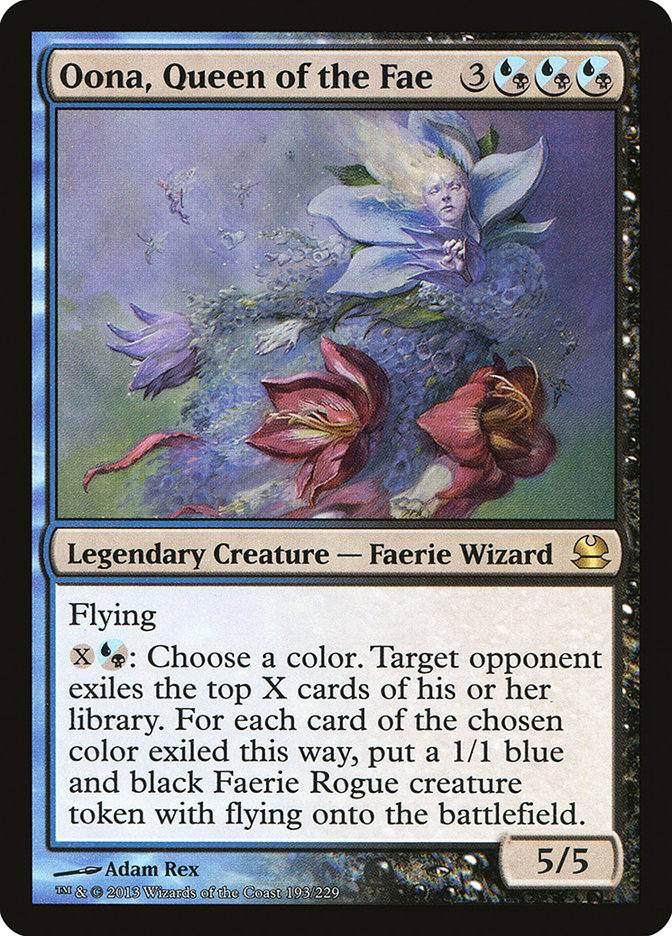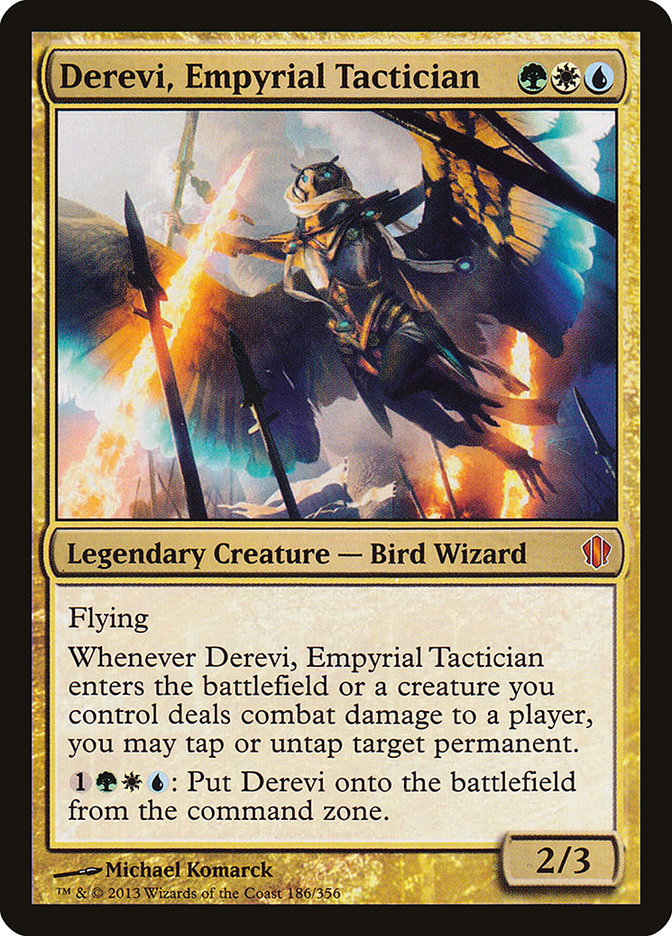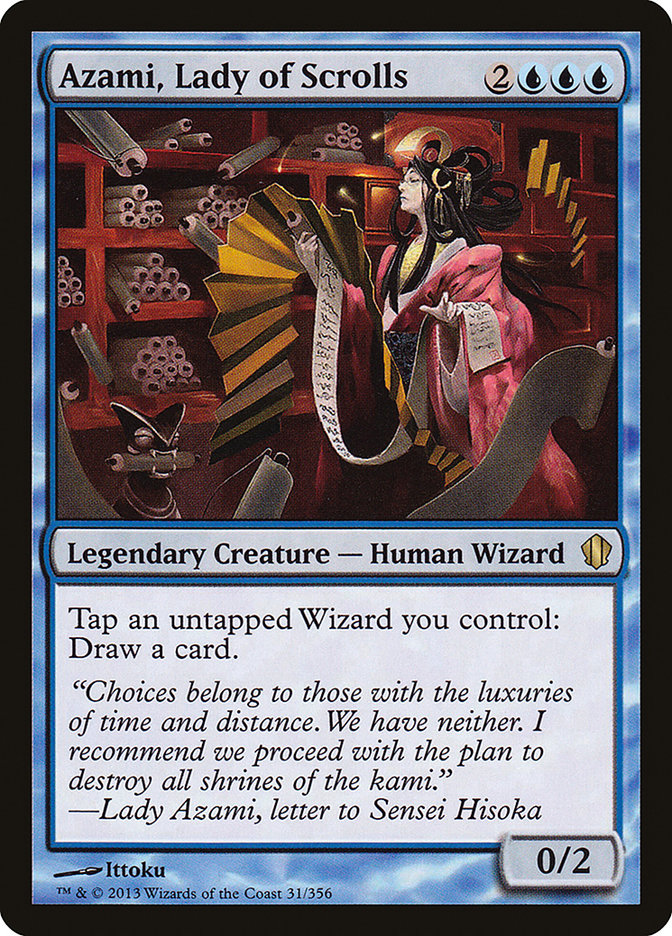I’m a bit of a weird person. That’s going to be true of a lot of adults who play what looks on the surface as a children’s card game, but even in a weird room I’m generally a bit odd even by comparison. I view life as an infinite series of contextual ethics problems, and “live your life as if any moment could be a trolley problem” doesn’t exactly maximize for personal comfort. It also gives me, an atheist, a rather unique definition of Hell: to me, Hell is a future of our own making.
I mean that in the Chinese-blessing-and-curse sort of way, “may you live in interesting times,” that there is a special kind of torment we can make for ourselves later in life by living badly. We can grow wiser as we grow older, but we lack the ability to retroactively apply that wisdom to the things we have done before – but thankfully here in Commander-land, we do get second chances.
The central foundation of the Commander format is the “social compact,” a mutually-agreed-upon belief that it is more important to have and share fun during the game than it is specifically to win the game, but not everyone gets that as soon as they meet the format. Big decks with few restriction offers a new player plenty of freedom and creative space to mess around in, so there’s no limit on the power you can harness to build the biggest and most broken thing you can imagine.
The only restriction that reasonably exists is in our heads: was that fun for us, and was that fun for others?
Maybe doing the broken thing is fun for us. I have played many a disgusting combo deck in my now two decades as a planeswalker; I wasn’t quite around long enough to power up a Channel and then Disintegrate or Fireball anybody, but I Vampiric Tutored for Cadaverous Bloom and cast Prosperity along with plenty of other folks and have spent an awful lot of time with Yawgmoth’s Bargain on the battlefield or doing nasty things quickly by activating Birthing Pod multiple times in a single turn.
In single-player competitive mode, you’re not necessarily playing for fun beyond the fact that winning is fun – and your opponent’s primary motivation isn’t fun either. You’re both jockeying primarily for the check-mark of a win, and there are format rules about what cards you can play but not about how you have to get there.
When you step from single-player competitive mode over to multiplayer casual, fun is the primary objective… and that requires the ability to empathize with others. If we want to have repeat experiences playing with other people, that means we are each responsible for playing the game so that the experience is enjoyable for all, to at least some degree, even though we could technically do far more broken things than you usually see in any given format. The central meaning of the social contract is this: yes, you could do the thing, but should you? This is a format that is about self-restraint and personal responsibility, not just doing as much as you want to as hard as you can.
The funny thing about social contracts is that without people to embody them, they’re just words on a piece of paper. The format does not defend itself; if you enjoy the spirit of play that Commander embodies, keeping things that way requires your participation. For most of us, that just means being on the same page as everybody else around us and only going as hard as the rest of the group wants to… for a thankfully-small group of players at any given point of time, it means finding out where the bright lines in the format lie by accidentally crossing them. People are quick vote with their feet to protect the format. If they didn’t have any fun playing with you and talking to you doesn’t seem like it is promising any change to your behavior, they’ll just decline to play with you. If enough people do that, you either start listening to what you were being told or you wander away to a format that supports your style of play.
There’s one easy and obvious metric you can use to figure this whole social element out. How you end the game is a choice you make, and how you end the game will often define whether or not the game has been worth it for everyone else. Nobody wants to be forced to the sidelines and told to watch their own deaths without being able to interact in any way; in the end it’s only a good game if everyone at least had a chance to be relevant. So how do you end a game?
There’s not necessarily a lot of agreement on this. We can all generally agree that infinite combos are kind of boring, and have time and time again observed that pursuing them can escalate the format to a kind of mutually-assured destruction wherein the entirety of the game is just an arms race between combo players to see who can execute “Kill everyone (Y/N)?” as quickly as possible.
Taking all of the turns so that literally you no longer have any opponents you need to worry about ever again is even worse. Sure, the game is definitely over, but it’s not technically over and everyone else would be completely correct to pack up their cards and walk away rather than watch you decide how to eventually kill your captive victims. Rendering your opponents spectators isn’t particularly fun either: you could cast Obliterate and then chip away at people with whatever big threat you somehow managed to follow it up with, or wipe the battlefield and use Myojin of Night’s Reach to prevent anyone from getting back into the game before you kill them, but should you?
If you don’t let your opponents interact in the end-game, did it ever matter that they were even there? If you could perform the same action sitting on your bed taking test-draws with your deck against a hypothetical goldfish, should we really be impressed that you assembled your combo on turn 3 again or put an arbitrarily large number of copies of Tendrils of Agony on the stack?
My personal preferences are idiomatic, and much to the consternation of a few readers over the years I’ve advocated for putting those end-game preferences into readers’ decks if they were far outside of the “bright lines” as it were. I like deckbuilding as an exercise in and of itself, and instead of aiming to crank up the power until it’s as high as it can get I like building a deck that is competitive enough that the specific cards don’t matter so long as the roles they fill have been met.
I don’t want to overpower my opponents or find myself overpowered because I’m playing too many pet fun cards and not enough real cardboard, and I consider the game to be satisfying so long as my victory or my defeat was a natural result of whether I played well or poorly. I have found that I’ll naturally scale to the same size in proportion to any play environment; the puzzle of building the deck into that sweet spot and then playing an engaging game of Magic is my key flavor of “fun.”
Fun is either an emotion or a sensation, depending on whose metaphysics you want to argue over; you either have an emotion you describe as “fun” that you directly experience or you sum up your diverse internal states over the course of a game into an experience you count as “fun” or “not fun” as the game progresses. The game may end before it gets to fun without being an actively un-fun experience, and you can even win the game without having had a single dollop of fun – emotions are weird. We can in fact go through the same emotions we describe as “enjoyable” over and over again for months without it once ever summing up to “fun” without even being aware of our internal states because it never added up to “un-fun,” just the absence of fun.
If you want to stay in the game, you presumably want to have fun; if you want others to play with you time and time again, you have to leave some room for them to have fun too. My deck-design principle tries to build decks that will play an enjoyable and interactive game for about an hour before grinding out enough of an advantage to win or outmaneuvering my opponents’ defenses one by one, and I try to go light on the tutors so I’m not seeing the same cards in every game and just repeating common lines of play.
One of my favorite cards in this format is Sunforger because it is so very much more powerful in Commander than it has ever been in any 60- or 40-card format, but it is also one of my least-favorite cards to actually play: once a Sunforger is rolling, everything quickly falls into repetition.
Funny how that works, sometimes.
As an added bonus, since there is no such thing as a “best deck in the format” or a clear metagame that needs to be conformed to in order to have a chance, you can build dozens of decks at a time and cycle through them in search of that moment of fun for yourself or others. There’s an easy way to avoid repetition: just grab a different deck. But you can have completely different decks with identically-flawed plans for how you end a game that destroy your fun and the fun of others. Do you routinely aim to win the game only after your opponents have been rendered unable to interact? Are you just assembling different two- and three-card infinite combos in different color combinations with different Commanders at the helm? Does anything your opponent might do to stop you actually matter, or do you build at such a high power level that their cards are merely an inconvenience on your way to inevitable victory?
You’ll win a lot more if any of these patterns of behavior are true, but that doesn’t mean anyone will have had a single iota of fun. Spending an hour to watch the inevitable outcome arrive once again right on time even though your commander is Oona, Queen of the Fae instead of Derevi, Empyrial Tactician is the kind of experience that will get your potential opponents sitting at some other table instead, and the entirety of the Commander social contract can be summed up in the phrase “Don’t be that person.”
You can in fact build a deck that never loses against almost any playgroup. Doing so requires never taking risks, and never being at risk of losing the game is about the same as saying “never let anybody else have any fun.” I would go so far as to say it’s not any fun for you either if you do so – if there’s no challenge, there’s nothing to be gained by a win. And as you find yourself frozen out by other players, you can’t help but notice that you did this to yourself: breaking the social contract can earn you a lot of game wins, but it also pushes you off into a corner while everyone else decided to still have fun with each other without you. Hell is a future of our own making.
So this week on Dear Azami, we have some bad news: there will be no “next week on Dear Azami.” Five years ago, give or take a little, I set out to build something that worked a bit differently from your usual column. Rather than building it around me as a person, I looked to build up an interaction with a community and have that take the forefront week after week. That goal of centering our readership worked so well that I was able to push myself even further out of the frame, hiring co-writers who would share the column header with me and even stepping off of the column entirely for a while and letting them carry it from there. It’s never been about me, and the bittersweet news is that the end of the column isn’t about me either, just about things that are out of everyone’s hands.
Along the way I’ve had the joy of sharing this space with three awesome co-authors, Cassidy McAuliffe, Jess Stirba and Levi Byrne, a few fun special guests like Sheldon Menery, David McDarby, and Patrick Chapin, and the community of interested volunteers that have always been at the center of making Dear Azami run. I’d aimed to make the column a “reader advice” column and that requires readers writing in to seek advice; over the five-year span of the column, a whopping 1500 different people wrote in to us for a bit of help in fixing their Commander decks.
I couldn’t have done this without Cass, Jess, and Levi, and I definitely couldn’t have done this without all of you – when I first pitched the idea of this column to StarCityGames.com, it was as a six-part series that was going to try to do something a bit weird and might last longer if they were interested. It lasted about 250 editions longer than that proposed six-column run, and everything beyond that is thanks to you. I’m grateful just to have been allowed along for the ride, and especially grateful to Cass, Jess and Levi as my fellow-travelers along the way.
I’ve been writing about this game off and on for about twenty years now; my first article went to the Magic Dojo, and I’ve had a lot of homes in between. It would feel weird to say goodbye because no goodbye I’ve said in the past has ever stuck, so we’ll leave it like this: so long, and thanks for all the fish.



